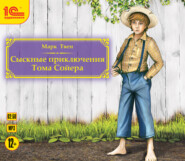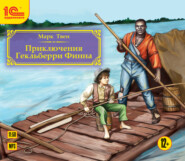По всем вопросам обращайтесь на: info@litportal.ru
(©) 2003-2025.
✖
A Tramp Abroad
Автор
Год написания книги
2015
Настройки чтения
Размер шрифта
Высота строк
Поля
Everywhere in the town were the mold and decay that go with antiquity, and evidence of it; but I do not know that anything else gave us so vivid a sense of the old age of Heilbronn as those foot-worn grooves in the paving-stones.
Chapter XIII
When we got back to the hotel I wound and set the pedometer and put it in my pocket, for I was to carry it next day and keep record of the miles we made. The work which we had given the instrument to do during the day which had just closed had not fatigued it perceptibly.
We were in bed by ten, for we wanted to be up and away on our tramp homeward with the dawn. I hung fire, but Harris went to sleep at once. I hate a man who goes to sleep at once; there is a sort of indefinable something about it which is not exactly an insult, and yet is an insolence; and one which is hard to bear, too. I lay there fretting over this injury, and trying to go to sleep; but the harder I tried, the wider awake I grew. I got to feeling very lonely in the dark, with no company but an undigested dinner. My mind got a start by and by, and began to consider the beginning of every subject which has ever been thought of; but it never went further than the beginning; it was touch and go; it fled from topic to topic with a frantic speed. At the end of an hour my head was in a perfect whirl and I was dead tired, fagged out.
The fatigue was so great that it presently began to make some head against the nervous excitement; while imagining myself wide awake, I would really doze into momentary unconsciousness, and come suddenly out of it with a physical jerk which nearly wrenched my joints apart – the delusion of the instant being that I was tumbling backward over a precipice. After I had fallen over eight or nine precipices and thus found out that one half of my brain had been asleep eight or nine times without the wide-awake, hard-working other half suspecting it, the periodical unconsciousnesses began to extend their spell gradually over more of my brain-territory, and at last I sank into a drowse which grew deeper and deeper and was doubtless just on the very point of being a solid, blessed dreamless stupor, when – what was that?
My dulled faculties dragged themselves partly back to life and took a receptive attitude. Now out of an immense, a limitless distance, came a something which grew and grew, and approached, and presently was recognizable as a sound – it had rather seemed to be a feeling, before. This sound was a mile away, now – perhaps it was the murmur of a storm; and now it was nearer – not a quarter of a mile away; was it the muffled rasping and grinding of distant machinery? No, it came still nearer; was it the measured tramp of a marching troop? But it came nearer still, and still nearer – and at last it was right in the room: it was merely a mouse gnawing the woodwork. So I had held my breath all that time for such a trifle.
Well, what was done could not be helped; I would go to sleep at once and make up the lost time. That was a thoughtless thought. Without intending it – hardly knowing it – I fell to listening intently to that sound, and even unconsciously counting the strokes of the mouse’s nutmeg-grater. Presently I was deriving exquisite suffering from this employment, yet maybe I could have endured it if the mouse had attended steadily to his work; but he did not do that; he stopped every now and then, and I suffered more while waiting and listening for him to begin again than I did while he was gnawing. Along at first I was mentally offering a reward of five – six – seven – ten – dollars for that mouse; but toward the last I was offering rewards which were entirely beyond my means. I close-reefed my ears – that is to say, I bent the flaps of them down and furled them into five or six folds, and pressed them against the hearing-orifice – but it did no good: the faculty was so sharpened by nervous excitement that it was become a microphone and could hear through the overlays without trouble.
My anger grew to a frenzy. I finally did what all persons before me have done, clear back to Adam, – resolved to throw something. I reached down and got my walking-shoes, then sat up in bed and listened, in order to exactly locate the noise. But I couldn’t do it; it was as allocatable as a cricket’s noise; and where one thinks that that is, is always the very place where it isn’t. So I presently hurled a shoe at random, and with a vicious vigor. It struck the wall over Harris’s head and fell down on him; I had not imagined I could throw so far. It woke Harris, and I was glad of it until I found he was not angry; then I was sorry. He soon went to sleep again, which pleased me; but straightway the mouse began again, which roused my temper once more. I did not want to wake Harris a second time, but the gnawing continued until I was compelled to throw the other shoe.
This time I broke a mirror – there were two in the room – I got the largest one, of course. Harris woke again, but did not complain, and I was sorrier than ever. I resolved that I would suffer all possible torture before I would disturb him a third time.
The mouse eventually retired, and by and by I was sinking to sleep, when a clock began to strike; I counted till it was done, and was about to drowse again when another clock began; I counted; then the two great RATHHAUS clock angels began to send forth soft, rich, melodious blasts from their long trumpets. I had never heard anything that was so lovely, or weird, or mysterious – but when they got to blowing the quarter-hours, they seemed to me to be overdoing the thing. Every time I dropped off for the moment, a new noise woke me. Each time I woke I missed my coverlet, and had to reach down to the floor and get it again.
At last all sleepiness forsook me. I recognized the fact that I was hopelessly and permanently wide awake. Wide awake, and feverish and thirsty. When I had lain tossing there as long as I could endure it, it occurred to me that it would be a good idea to dress and go out in the great square and take a refreshing wash in the fountain, and smoke and reflect there until the remnant of the night was gone.
I believed I could dress in the dark without waking Harris. I had banished my shoes after the mouse, but my slippers would do for a summer night. So I rose softly, and gradually got on everything – down to one sock. I couldn’t seem to get on the track of that sock, any way I could fix it. But I had to have it; so I went down on my hands and knees, with one slipper on and the other in my hand, and began to paw gently around and rake the floor, but with no success. I enlarged my circle, and went on pawing and raking. With every pressure of my knee, how the floor creaked! and every time I chanced to rake against any article, it seemed to give out thirty-five or thirty-six times more noise than it would have done in the daytime. In those cases I always stopped and held my breath till I was sure Harris had not awakened – then I crept along again. I moved on and on, but I could not find the sock; I could not seem to find anything but furniture. I could not remember that there was much furniture in the room when I went to bed, but the place was alive with it now – especially chairs – chairs everywhere – had a couple of families moved in, in the mean time? And I never could seem to glance on one of those chairs, but always struck it full and square with my head. My temper rose, by steady and sure degrees, and as I pawed on and on, I fell to making vicious comments under my breath.
Finally, with a venomous access of irritation, I said I would leave without the sock; so I rose up and made straight for the door – as I supposed – and suddenly confronted my dim spectral image in the unbroken mirror. It startled the breath out of me, for an instant; it also showed me that I was lost, and had no sort of idea where I was. When I realized this, I was so angry that I had to sit down on the floor and take hold of something to keep from lifting the roof off with an explosion of opinion. If there had been only one mirror, it might possibly have helped to locate me; but there were two, and two were as bad as a thousand; besides, these were on opposite sides of the room. I could see the dim blur of the windows, but in my turned-around condition they were exactly where they ought not to be, and so they only confused me instead of helping me.
I started to get up, and knocked down an umbrella; it made a noise like a pistol-shot when it struck that hard, slick, carpetless floor; I grated my teeth and held my breath – Harris did not stir. I set the umbrella slowly and carefully on end against the wall, but as soon as I took my hand away, its heel slipped from under it, and down it came again with another bang. I shrunk together and listened a moment in silent fury – no harm done, everything quiet. With the most painstaking care and nicety, I stood the umbrella up once more, took my hand away, and down it came again.
I have been strictly reared, but if it had not been so dark and solemn and awful there in that lonely, vast room, I do believe I should have said something then which could not be put into a Sunday-school book without injuring the sale of it. If my reasoning powers had not been already sapped dry by my harassments, I would have known better than to try to set an umbrella on end on one of those glassy German floors in the dark; it can’t be done in the daytime without four failures to one success. I had one comfort, though – Harris was yet still and silent – he had not stirred.
The umbrella could not locate me – there were four standing around the room, and all alike. I thought I would feel along the wall and find the door in that way. I rose up and began this operation, but raked down a picture. It was not a large one, but it made noise enough for a panorama. Harris gave out no sound, but I felt that if I experimented any further with the pictures I should be sure to wake him. Better give up trying to get out. Yes, I would find King Arthur’s Round Table once more – I had already found it several times – and use it for a base of departure on an exploring tour for my bed; if I could find my bed I could then find my water pitcher; I would quench my raging thirst and turn in. So I started on my hands and knees, because I could go faster that way, and with more confidence, too, and not knock down things. By and by I found the table – with my head – rubbed the bruise a little, then rose up and started, with hands abroad and fingers spread, to balance myself. I found a chair; then a wall; then another chair; then a sofa; then an alpen-stock, then another sofa; this confounded me, for I had thought there was only one sofa. I hunted up the table again and took a fresh start; found some more chairs.
It occurred to me, now, as it ought to have done before, that as the table was round, it was therefore of no value as a base to aim from; so I moved off once more, and at random among the wilderness of chairs and sofas – wandering off into unfamiliar regions, and presently knocked a candlestick and knocked off a lamp, grabbed at the lamp and knocked off a water pitcher with a rattling crash, and thought to myself, “I’ve found you at last – I judged I was close upon you.” Harris shouted “murder,” and “thieves,” and finished with “I’m absolutely drowned.”
The crash had roused the house. Mr. X pranced in, in his long night-garment, with a candle, young Z after him with another candle; a procession swept in at another door, with candles and lanterns – landlord and two German guests in their nightgowns and a chambermaid in hers.
I looked around; I was at Harris’s bed, a Sabbath-day’s journey from my own. There was only one sofa; it was against the wall; there was only one chair where a body could get at it – I had been revolving around it like a planet, and colliding with it like a comet half the night.
I explained how I had been employing myself, and why. Then the landlord’s party left, and the rest of us set about our preparations for breakfast, for the dawn was ready to break. I glanced furtively at my pedometer, and found I had made 47 miles. But I did not care, for I had come out for a pedestrian tour anyway.
Chapter XIV
When the landlord learned that I and my agents were artists, our party rose perceptibly in his esteem; we rose still higher when he learned that we were making a pedestrian tour of Europe.
He told us all about the Heidelberg road, and which were the best places to avoid and which the best ones to tarry at; he charged me less than cost for the things I broke in the night; he put up a fine luncheon for us and added to it a quantity of great light-green plums, the pleasantest fruit in Germany; he was so anxious to do us honor that he would not allow us to walk out of Heilbronn, but called up Goetz von Berlichingen’s horse and cab and made us ride.
I made a sketch of the turnout. It is not a Work, it is only what artists call a “study”—a thing to make a finished picture from. This sketch has several blemishes in it; for instance, the wagon is not traveling as fast as the horse is. This is wrong. Again, the person trying to get out of the way is too small; he is out of perspective, as we say. The two upper lines are not the horse’s back, they are the reigns; there seems to be a wheel missing – this would be corrected in a finished Work, of course. This thing flying out behind is not a flag, it is a curtain. That other thing up there is the sun, but I didn’t get enough distance on it. I do not remember, now, what that thing is that is in front of the man who is running, but I think it is a haystack or a woman. This study was exhibited in the Paris Salon of 1879, but did not take any medal; they do not give medals for studies.
We discharged the carriage at the bridge. The river was full of logs – long, slender, barkless pine logs – and we leaned on the rails of the bridge, and watched the men put them together into rafts. These rafts were of a shape and construction to suit the crookedness and extreme narrowness of the Neckar. They were from fifty to one hundred yards long, and they gradually tapered from a nine-log breadth at their sterns, to a three-log breadth at their bow-ends. The main part of the steering is done at the bow, with a pole; the three-log breadth there furnishes room for only the steersman, for these little logs are not larger around than an average young lady’s waist. The connections of the several sections of the raft are slack and pliant, so that the raft may be readily bent into any sort of curve required by the shape of the river.
The Neckar is in many places so narrow that a person can throw a dog across it, if he has one; when it is also sharply curved in such places, the raftsman has to do some pretty nice snug piloting to make the turns. The river is not always allowed to spread over its whole bed – which is as much as thirty, and sometimes forty yards wide – but is split into three equal bodies of water, by stone dikes which throw the main volume, depth, and current into the central one. In low water these neat narrow-edged dikes project four or five inches above the surface, like the comb of a submerged roof, but in high water they are overflowed. A hatful of rain makes high water in the Neckar, and a basketful produces an overflow.
There are dikes abreast the Schloss Hotel, and the current is violently swift at that point. I used to sit for hours in my glass cage, watching the long, narrow rafts slip along through the central channel, grazing the right-bank dike and aiming carefully for the middle arch of the stone bridge below; I watched them in this way, and lost all this time hoping to see one of them hit the bridge-pier and wreck itself sometime or other, but was always disappointed. One was smashed there one morning, but I had just stepped into my room a moment to light a pipe, so I lost it.
While I was looking down upon the rafts that morning in Heilbronn, the daredevil spirit of adventure came suddenly upon me, and I said to my comrades:
“I am going to Heidelberg on a raft. Will you venture with me?”
Their faces paled a little, but they assented with as good a grace as they could. Harris wanted to cable his mother – thought it his duty to do that, as he was all she had in this world – so, while he attended to this, I went down to the longest and finest raft and hailed the captain with a hearty “Ahoy, shipmate!” which put us upon pleasant terms at once, and we entered upon business. I said we were on a pedestrian tour to Heidelberg, and would like to take passage with him. I said this partly through young Z, who spoke German very well, and partly through Mr. X, who spoke it peculiarly. I can understand German as well as the maniac that invented it, but I talk it best through an interpreter.
The captain hitched up his trousers, then shifted his quid thoughtfully. Presently he said just what I was expecting he would say – that he had no license to carry passengers, and therefore was afraid the law would be after him in case the matter got noised about or any accident happened. So I chartered the raft and the crew and took all the responsibilities on myself.
With a rattling song the starboard watch bent to their work and hove the cable short, then got the anchor home, and our bark moved off with a stately stride, and soon was bowling along at about two knots an hour.
Our party were grouped amidships. At first the talk was a little gloomy, and ran mainly upon the shortness of life, the uncertainty of it, the perils which beset it, and the need and wisdom of being always prepared for the worst; this shaded off into low-voiced references to the dangers of the deep, and kindred matters; but as the gray east began to redden and the mysterious solemnity and silence of the dawn to give place to the joy-songs of the birds, the talk took a cheerier tone, and our spirits began to rise steadily.
Germany, in the summer, is the perfection of the beautiful, but nobody has understood, and realized, and enjoyed the utmost possibilities of this soft and peaceful beauty unless he has voyaged down the Neckar on a raft. The motion of a raft is the needful motion; it is gentle, and gliding, and smooth, and noiseless; it calms down all feverish activities, it soothes to sleep all nervous hurry and impatience; under its restful influence all the troubles and vexations and sorrows that harass the mind vanish away, and existence becomes a dream, a charm, a deep and tranquil ecstasy. How it contrasts with hot and perspiring pedestrianism, and dusty and deafening railroad rush, and tedious jolting behind tired horses over blinding white roads!
We went slipping silently along, between the green and fragrant banks, with a sense of pleasure and contentment that grew, and grew, all the time. Sometimes the banks were overhung with thick masses of willows that wholly hid the ground behind; sometimes we had noble hills on one hand, clothed densely with foliage to their tops, and on the other hand open levels blazing with poppies, or clothed in the rich blue of the corn-flower; sometimes we drifted in the shadow of forests, and sometimes along the margin of long stretches of velvety grass, fresh and green and bright, a tireless charm to the eye. And the birds! – they were everywhere; they swept back and forth across the river constantly, and their jubilant music was never stilled.
It was a deep and satisfying pleasure to see the sun create the new morning, and gradually, patiently, lovingly, clothe it on with splendor after splendor, and glory after glory, till the miracle was complete. How different is this marvel observed from a raft, from what it is when one observes it through the dingy windows of a railway-station in some wretched village while he munches a petrified sandwich and waits for the train.
Chapter XV
Down The River
Men and women and cattle were at work in the dewy fields by this time. The people often stepped aboard the raft, as we glided along the grassy shores, and gossiped with us and with the crew for a hundred yards or so, then stepped ashore again, refreshed by the ride.
Only the men did this; the women were too busy. The women do all kinds of work on the continent. They dig, they hoe, they reap, they sow, they bear monstrous burdens on their backs, they shove similar ones long distances on wheelbarrows, they drag the cart when there is no dog or lean cow to drag it – and when there is, they assist the dog or cow. Age is no matter – the older the woman the stronger she is, apparently. On the farm a woman’s duties are not defined – she does a little of everything; but in the towns it is different, there she only does certain things, the men do the rest. For instance, a hotel chambermaid has nothing to do but make beds and fires in fifty or sixty rooms, bring towels and candles, and fetch several tons of water up several flights of stairs, a hundred pounds at a time, in prodigious metal pitchers. She does not have to work more than eighteen or twenty hours a day, and she can always get down on her knees and scrub the floors of halls and closets when she is tired and needs a rest.
As the morning advanced and the weather grew hot, we took off our outside clothing and sat in a row along the edge of the raft and enjoyed the scenery, with our sun-umbrellas over our heads and our legs dangling in the water.
Every now and then we plunged in and had a swim. Every projecting grassy cape had its joyous group of naked children, the boys to themselves and the girls to themselves, the latter usually in care of some motherly dame who sat in the shade of a tree with her knitting. The little boys swam out to us, sometimes, but the little maids stood knee-deep in the water and stopped their splashing and frolicking to inspect the raft with their innocent eyes as it drifted by. Once we turned a corner suddenly and surprised a slender girl of twelve years or upward, just stepping into the water. She had not time to run, but she did what answered just as well; she promptly drew a lithe young willow bough athwart her white body with one hand, and then contemplated us with a simple and untroubled interest. Thus she stood while we glided by. She was a pretty creature, and she and her willow bough made a very pretty picture, and one which could not offend the modesty of the most fastidious spectator. Her white skin had a low bank of fresh green willows for background and effective contrast – for she stood against them – and above and out of them projected the eager faces and white shoulders of two smaller girls.
Toward noon we heard the inspiriting cry, —
“Sail ho!”
“Where away?” shouted the captain.
“Three points off the weather bow!”
We ran forward to see the vessel. It proved to be a steamboat – for they had begun to run a steamer up the Neckar, for the first time in May. She was a tug, and one of a very peculiar build and aspect. I had often watched her from the hotel, and wondered how she propelled herself, for apparently she had no propeller or paddles. She came churning along, now, making a deal of noise of one kind or another, and aggravating it every now and then by blowing a hoarse whistle. She had nine keel-boats hitched on behind and following after her in a long, slender rank. We met her in a narrow place, between dikes, and there was hardly room for us both in the cramped passage. As she went grinding and groaning by, we perceived the secret of her moving impulse. She did not drive herself up the river with paddles or propeller, she pulled herself by hauling on a great chain. This chain is laid in the bed of the river and is only fastened at the two ends. It is seventy miles long. It comes in over the boat’s bow, passes around a drum, and is payed out astern. She pulls on that chain, and so drags herself up the river or down it. She has neither bow or stern, strictly speaking, for she has a long-bladed rudder on each end and she never turns around. She uses both rudders all the time, and they are powerful enough to enable her to turn to the right or the left and steer around curves, in spite of the strong resistance of the chain. I would not have believed that that impossible thing could be done; but I saw it done, and therefore I know that there is one impossible thing which can be done. What miracle will man attempt next?
We met many big keel-boats on their way up, using sails, mule power, and profanity – a tedious and laborious business. A wire rope led from the foretopmast to the file of mules on the tow-path a hundred yards ahead, and by dint of much banging and swearing and urging, the detachment of drivers managed to get a speed of two or three miles an hour out of the mules against the stiff current. The Neckar has always been used as a canal, and thus has given employment to a great many men and animals; but now that this steamboat is able, with a small crew and a bushel or so of coal, to take nine keel-boats farther up the river in one hour than thirty men and thirty mules can do it in two, it is believed that the old-fashioned towing industry is on its death-bed. A second steamboat began work in the Neckar three months after the first one was put in service.
At noon we stepped ashore and bought some bottled beer and got some chickens cooked, while the raft waited; then we immediately put to sea again, and had our dinner while the beer was cold and the chickens hot. There is no pleasanter place for such a meal than a raft that is gliding down the winding Neckar past green meadows and wooded hills, and slumbering villages, and craggy heights graced with crumbling towers and battlements.
In one place we saw a nicely dressed German gentleman without any spectacles. Before I could come to anchor he had got underway. It was a great pity. I so wanted to make a sketch of him. The captain comforted me for my loss, however, by saying that the man was without any doubt a fraud who had spectacles, but kept them in his pocket in order to make himself conspicuous.

















